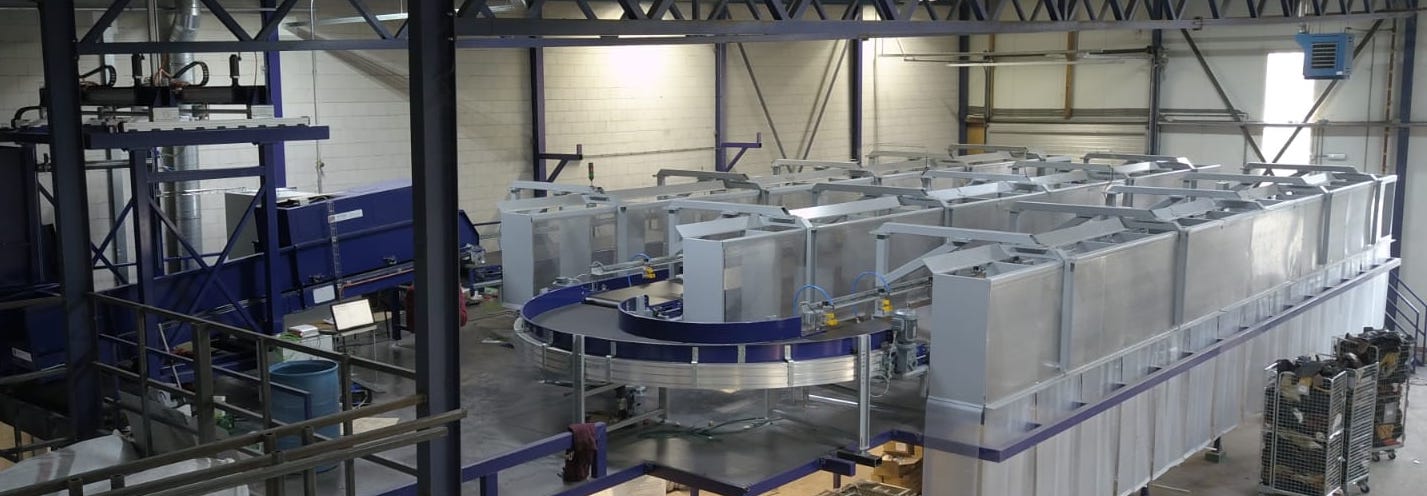AFTER THREE YEARS, OUR PROJECT IS COMING TO AN END AND WE WOULD LIKE YOU TO JOIN US IN OUR CELEBRATIONS!
The Fibersort project has been running since 2016, aimed at realising the widespread implementation of the automated sorting technology by validating it as a key value adding innovation to enable textile-to-textile recycling.
On March 12, we will have our final celebration, to see the Fibersort in action, learn more about our successes, our challenges and the work that needs to continue happening to ensure the successful development of the end-of-use textiles value chain. Due to limited capacity, we cannot host as many people as we would love to. Kindly let us know if you are interested in attending and we will forward you an invitation, based on availability.
We very much look forward to meeting you there!
Venue: Wieland Textiles B.V. - Handelsweg 8, 1521 NH Wormerveer, Netherlands
Date: 12 March 2020, 11:30 - 17:30
11:30-13:00 Arrival at Wieland Textiles including tour of the facility and sandwich lunch (Kindly note that the last tour of the facility will start at 12.30. If you arrive at a later time, entrance will be directly to the event space).
13:00-14:30 Plenary opening and keynotes
Speakers: Martijn Lopes Cardozo - CEO Circle Economy, Eva Engelen - CSR Advisor MUD Jeans, Ruut Louwers - Programme Director Interreg NWE, Hilde van Duijn - Project Manager Interreg NWE Fibersort.
Panel with project partners: Hans Bon - Smart Fibersorting, Simon Smedinga - Stichting Leger des Heils Reshare, Nicolas Douchy - Procotex, Marieke Akerboom - Worn Again and Maurits Vandeputte - Valvan Baling Systems. Moderated by Linda Vermaat.
14:30-15:00 Coffee break
15:00-16:00 Parallel sessions
- Your clothes or mine? Old and new business models in a circular textiles industry
The transition to a circular textiles industry affects existing business models and creates opportunities for new ones to emerge. New businesses focusing on renting, leasing or the repair of garments have shown an impressive growth recently, and are expected to continue this trend in the years to come. Meanwhile, established end-of-use value chain players struggle to continue business as usual. This session explores the potential of existing and new business models in a circular textiles industry, based on case studies of several established and newer frontrunning organisations.
Panel: Eva Engelen - MUD Jeans, , Jeff Denby - The Renewal Workshop, Simon Smedinga - Leger des Heils ReShare
Moderator: Gwen Cunningham
- Turning post-consumer textiles into new resources: experiences from the field
The accelerating consumption and disposal practices in Europe lead to a large mountain of post-consumer textiles that are currently mostly being downcycled, incinerated or landfilled. There is a huge potential for the textiles that cannot be sold on the second-hand market to be recycled into new textiles according to their material and characteristics. This session aims to share industry experiences and insights into the high-value recycling of non-rewearable textiles as well as discuss the future possibilities to tackle technical and financial challenges that remain.
Panel: Anna Pehrsson - TEXAID, Ellen Mensink - Loop.a.life, Nicolas Douchy - Procotex Corporation.
Moderator: Natalia Papú Carrone
- Private products, a public headache.
While an increasing number of collectors, sorters and recyclers explore possibilities to find high-value applications for used textiles and scale these operations, and brands start integrating recycled content into their collections, the reality is that currently less than 1% of textiles collected are recycled into new ones, and around half of them are being downcycled, incinerated or landfilled. Through policy instruments such as the Separate Collection for Textiles EU Directive, the recently launched European Green Deal and National and Regional Transition Agendas, European, national and regional governments have expressed their ambitions to transition to a circular economy for textiles. This session explores the role that public and private actors can play in creating an enabling environment for circular textiles.
Panel: Bente Bauer - Policy Hub, Mariska Zandvliet - EURIC, Stef le Fèvre - City of Amsterdam
Moderator: Hilde Van Duijn
- Chemical recycling: near future or distant reality? Closing the financial gap
Now numerous chemical recycling technologies have proven their technical feasibility, they struggle to access the financial means to scale their operations from a pilot facility to a demo plant. As the fashion industry as well as governments acknowledge the need for these technologies to scale in order to reintroduce materials into the textile value chains, financial solutions are required for relatively small recycling pioneers to take the leap from great idea to reality. This session assesses the (im)possibilities of existing public and private financial instruments and explores potential ways forward for organisations like Worn Again to realise their ambitions.
Panel: Keith Wiggins - Worn Again, Rogier van Mazijk - Fashion for Good, Hein Brekelmans - ABN Amro, Esther Veenendaal - Rijksdienst voor Ondernemend Nederland
Moderator: Fieke de Haan
- Fibersort Facts and Fables: an opportunity to dive deeper into the technology
An additional opportunity to learn all about the Fibersort technology, its functionalities and potential from the developers.
Speakers: Maurits Vandeputte - Valvan Baling Systems and Hans Bon/ Mitch - Smart Fibersorting
16:00-16:15 Official launch of the Fibersort
16:15-17:30 Celebration drinks

